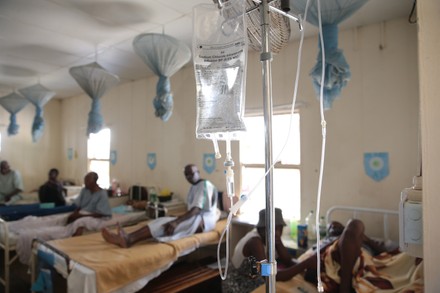HIV & Aids deaths increasing in Zimbabwe
THE head of the Criminal Investigations Department homicide division in Harare was assaulted and robbed of US$140 and a service pistol in a dramatic encounter in the city centre.
This emerged at the Harare Magistrates Court where four suspects appeared before regional magistrate Clever Tsikwa facing assault and robbery charges on Wednesday.
Tsika, however, acquitted Munyaradzi Chatonzwa, Mark Tatenda Chingombe and Simbarashe Steven Ota but found Sydney Rande guilty of assault and convicted him.
Tsikwa initially sentenced Rande to 12 months in jail before suspending them on condition that he pays a US$300 fine.
It was the State’s case that on September 30, Alexandra Jachi was driving a Toyota Fortuner on his way to his residence in Chitungwiza from Highfield when he realised that the suspects were trailing him.
He drove to Jongwe Corner for safety and as soon as he parked the vehicle, Chatonzwa and Rande allegedly got out of their car and charged towards the top cop.
Jachi disembarked from his vehicle and fired a warning shot in the air from a 9mm police service Taurus pistol to scare Chatonzwa away, but he continued advancing towards him.
Jachi shot Chatonzwa once on the left leg but instead of retreating, he advanced further and struck the top cop with an unknown object and he fell down.
The court heard how Chatonzwa and accomplices assaulted Jachi until he lost consciousness.
Onlookers, who attempted to save Jachi, were also attacked by the alleged robbers.
They went on to search Jachi and stole his wallet containing US$140, service pistol and his identity cards.
The service pistol is yet to be recovered.
NewsDay
ZIMBABWE has recorded an increase in HIV/Aids-related deaths for the period January to June this year compared to the same period in 2024 amid concerns by lawmakers that foreign aid cuts to life-saving programmes are begging to be felt.
Health and Child Care minister Douglas Mombeshora, however, was quick to allay the fears saying the increase in HIV/Aids-related deaths was not related to funding cuts.
Kwekwe legislator Corban Madzivanyika had asked Mombeshora to provide statistics of people who succumbed to the chronic disease in Zimbabwe during the first half of the year.
“My response to question number 9 is that Aids deaths in 2024 from January to June were 5 712. Forthe same period, January to June 2025, there were 5 932,” Mombeshora said in response on Wednesday in Parliament.
“This means that in 2025, there were 220 more deaths compared to 2024 over the same period.”
Madzivanyika followed up with a supplementary question asking, “Is it not that this increment represents the challenge that we are now facing or the burden that has now increased, now that development partners have left Zimbabwe in terms of funding for HIV and Aids-related programmes?”
Mombeshora said the increase could not be attributed to the withdrawal of funds by partners.
According to Mombeshora, the country’s hospitals were fully stocked with life-saving drugs before the funding cuts.
“From January to June, the commodities for HIV/Aids had already been procured and the programmes have been progressing well,” he said.
“I think I have said this before in this Parliament that all patients on HIV treatment should not panic because we have enough medicines for them.
“I cannot give a specific reason now to say why we have these figures. Usually, we wait until the end of the year.”
He added: “You may find that maybe by the end of the year, we may have fewer figures for this year than last year.
“At the end of the year, that is when we start looking at month by month and try to see where we have missed it or find the reasons why the figures are going up, but at the moment, it is not related to the withdrawal because the commodities are there.”
Emakhandeni-Luveve lawmaker Discent Bajila and his Chiredzi Central counterpart, Ropafadzo Makumire, were, however, not convinced by Mombeshora’s explanation.
“We are left with 12 days of this month. What happens to our capacity to handle HIV/Aids cases post the 30th of June?” Bajila asked.
Makumire added: “What could be attributed to this increase, if he is denying that it has something to do with the withdrawal of donor funding?”
Mombeshora insisted that there was no need for panic in terms of availability of stocks of life-saving drugs.
“As the government, we have already procured commodities at the present moment to take us up to the end of September and we are still receiving more commodities to take us up to the end of the year. So, there are no shortages at all,” Mombeshora said.
Temporary Speaker of the National, Joe Tshuma, defended the minister, saying he had clearly explained himself on the matter.
“Whatever happened between January and June, it definitely could not have been the issue of a lack of medicine,” Tshuma said.
“So, I do not know what you want him to clarify. Did you want him to be God to tell you he knows how people have died? I think your question is a bit impossible.”
United States President Donald Trump froze many foreign aid programmes early in his presidency, before reinstating some life-saving assistance, including part of the United States President’s Emergency Plan for Aids Relief, its global HIV initiative.
The Trump administration also decided to stop funding UNAids, the UN’s HIV/Aids programme that serves communities around the world.
According to the World Health Organisation, Zimbabwe has successfully achieved the 95-95-95 UNAids Fast-Track targets for adults, underscoring the country’s ongoing commitment to tackling the HIV epidemic.
These targets mean that 95% of people living with HIV know their status, 95% of those diagnosed are receiving treatment and 95% of those on treatment have achieved viral load suppression.
NewsDay




